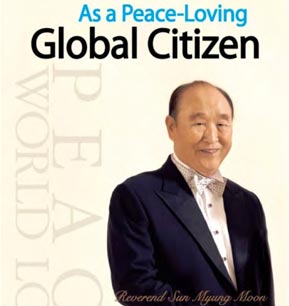ShareThis
Rev. Sun Myung Moon

As a Peace-loving Global Citizen is the autobiography of Rev. Sun Myung Moon, the founder of the Unification Movement. It was published in 2009 in both Korean and English by Gimm-Young Publishers of Seoul, South Korea. The book was released in South Korea on March 9, 2009 and debuted at #3 on the Businesss bestseller's list. It has ranked in various bestseller lists since then and was ranked 15th on the General bestseller's list as of October 14, 2009.
Paying the Ultimate Price to Follow God’s Path
After such efforts made at the risk of his life over a year and a half, Bong Choon Choi established the church in Japan in October 1959. Korea and Japan would not establish diplomatic relations for another six years. In fact Korea, because the painful memory of suffering under Japan’s colonial rule was still quite fresh, was rebuffing any suggestion that it open contacts with Japan. I had our missionary smuggle himself into this enemy country for the sake of Korea’s future. Instead of refusing all contact, Korea needed to evangelize Japan so that it would be in the position to be the senior partner in the bilateral relationship. Korea was impoverished materially, so it needed to open a channel to the Japanese leadership, get Japan on its side, and then link itself to the United States. That was how Korea could survive. As a result of the successful effort to send a missionary to Japan, owing to Bong Choon Choi’s sacrifice, an exceptional youth leader named Osamu Kuboki joined the church, together with a group of young people who followed him. The Japanese church became securely established as a result of their work.
We sent missionaries to America in the following year. There was no visa trouble this time. They were able to receive passports and visas before leaving. In securing the passports, we were aided by some cabinet ministers of the Liberal Party who had played a part in having me imprisoned in the Seodaemun Prison. Previously, they had opposed us, but now they were helping us. The United States in those days seemed like a very far-off country. Some of our church members opposed the idea of sending missionaries there, saying it was more important to grow our foundation in Korea first. I convinced the members of its importance, however, saying that unless America’s crisis could be resolved, Korea would be destroyed, too. In January 1959, we sent Young Oon Kim, one of the professors who had been fired by Ewha Womans University. Then in September of that year, we sent David S.C. Kim. The work they began in America was aimed at the entire world.
Tuesday, December 07, 2010
|
Labels:
Paying the Ultimate Price to Follow God’s Path part3
|
CONTENT
- FOREWORD
- CHAPTER ONE - Food is Love
- CHAPTER TWO - A River of Heart Flows with Tears
- CHAPTER THREE - The Man with the Fullest Stomach
- CHAPTER FOUR - Why We Work Globally
- CHAPTER FIVE - True Families Create True People
- CHAPTER SIX - Love Will Bring Unification
- CHAPTER SEVEN - Future of Korea, Future of the Wor...
- CHAPTER EIGHT - Message for Young People
